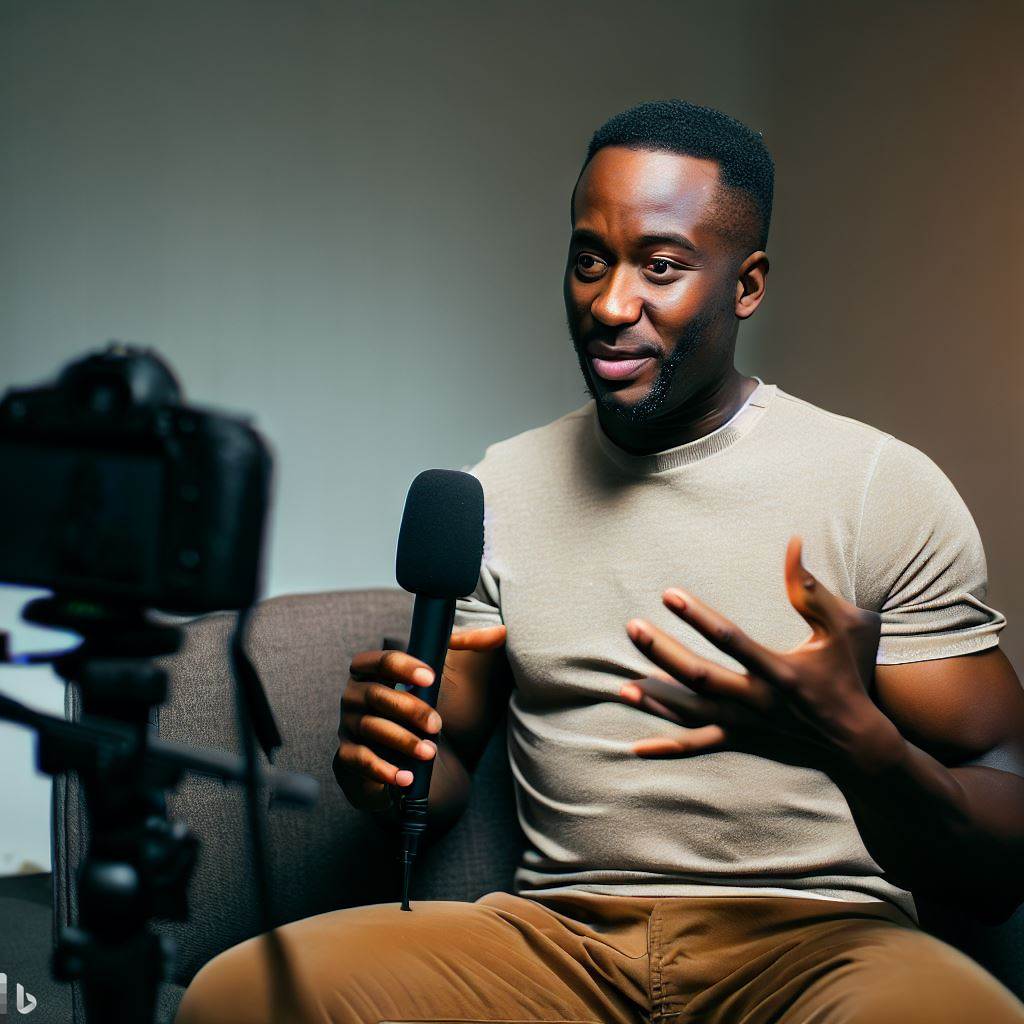Introduction
An artist agent is a professional who represents and promotes artists in the creative industry.
The purpose of this blog post is to discuss the top skills needed for artist agents in Nigeria.
- Skill 1: Excellent Communication Abilities
Artist agents must possess strong communication skills to effectively communicate with artists and clients. - Skill 2: Marketing and Networking Expertise
Artist agents need to have marketing knowledge and the ability to network to promote artists and secure opportunities. - Skill 3: Negotiation Skills
Being skilled negotiators is crucial for artist agents as they negotiate contracts, deals, and fees on behalf of artists. - Skill 4: Knowledge of the Industry
Artist agents should stay updated with current trends, industry events, and market demands to better serve their artists. - Skill 5: Organizational Skills
Having strong organisational skills helps artist agents manage artists’ schedules, contracts, and logistics efficiently. - Skill 6: Business Acumen
Artist agents need a good understanding of business principles to handle financial aspects and make informed decisions. - Skill 7: Creativity and Critical Thinking
Creativity and critical thinking are essential for artist agents to come up with innovative strategies and solutions. - Skill 8: Adaptability and Resilience
Being adaptable and resilient is crucial for artist agents to navigate the unpredictable nature of the creative industry. - Skill 9: Multitasking Abilities
Artist agents should be able to handle multiple tasks simultaneously, managing artists, projects, and client relationships.
Artist agents in Nigeria require a diverse set of skills to thrive in the dynamic creative industry.
From communication and marketing expertise to negotiation and organizational abilities, these skills are essential for success in the role.
Developing and honing these skills will ensure artist agents can effectively represent and promote artists, contributing to their growth and success in the industry.
Importance of Artist Agents in Nigeria
A. The growing art industry in Nigeria
- Nigeria’s art industry is experiencing significant growth and recognition on both local and international levels.
- The country is home to talented artists who create diverse and unique artworks.
- Nigerian art fairs, galleries, and exhibitions have gained popularity worldwide, attracting art enthusiasts and collectors.
- The art industry plays a crucial role in the country’s economy and cultural identity.
B. Role Of Artist Agents In Promoting And Representing Artists
- Artist agents act as intermediaries between artists, buyers, collectors, and art institutions.
- They help artists gain exposure by connecting them with galleries, museums, and art events.
- Artist agents negotiate contracts, pricing, and terms on behalf of artists, ensuring their best interests.
- They promote artists’ works through marketing strategies, social media, and collaborations.
- Artist agents create opportunities for artists to exhibit their works nationally and internationally.
- They act as advocates for artists, showcasing their talent and supporting their artistic vision.
C. How Artist Agents Help Artists Navigate The Art Market
- Artist agents have extensive knowledge of the art market, trends, and collectors’ preferences.
- They provide guidance and advice to artists on pricing their works competitively.
- Artist agents help artists build a strong professional network within the art industry.
- They assist artists in developing their artistic portfolios and creating impacting presentations.
- Artist agents organise art events, exhibitions, and shows where artists can showcase their works.
- They handle logistics, sales, and administrative tasks, allowing artists to focus on their creativity.
Communication and Negotiation Skills
A. Importance of effective communication between artist agents and clients
- Clear and efficient communication is crucial for artist agents to understand their clients’ needs.
- Effective communication ensures that artists’ vision and goals are accurately conveyed to clients.
- Good communication builds trust between artist agents and clients, fostering strong professional relationships.
- Artists can rely on agents to effectively communicate feedback, requests, and offers to clients.
- Clear and concise communication helps avoid misunderstandings and reduces the likelihood of conflicts.
B. Negotiation skills necessary for artist agents
Negotiation Skills Necessary For Artist Agents To Secure Beneficial Deals And Contracts For Artists
- Artist agents must possess strong persuasive skills to negotiate favourable terms for their clients.
- Negotiation skills enable agents to secure higher pay and royalties for artists.
- Agents with negotiation expertise can protect artists’ rights and ensure fair treatment in contracts.
- Agents should be skilled in bargaining, finding common ground, and problem-solving during negotiations.
- Successful negotiations can lead to long-term collaborations and increased opportunities for artists.
C. Examples of successful negotiation processes and results for Nigerian artists
- In negotiations with record labels, artist agents have secured more favourable royalty percentages for artists.
- Agents have successfully negotiated for increased marketing and promotional budgets for their clients.
- Through negotiation, artists have secured better performance contracts with higher fees and improved terms.
- Artist agents have negotiated for artists to retain the rights to their music and creative works.
- Successful negotiations have led to international collaborations and exposure for Nigerian artists.
Communication and negotiation skills are essential for artist agents in Nigeria.
Effective communication helps convey artists’ vision and goals, fostering strong relationships with clients.
Negotiation skills enable agents to secure beneficial deals and contracts, protecting artists’ rights and maximising their opportunities.
Through successful negotiation processes, Nigerian artists have achieved improved royalty percentages, marketing budgets, performance contracts, and international collaborations.
Read:Nigeria’s Animation Industry: Opportunities & Challenges
Knowledge of the Art Market in Nigeria
A. Importance of understanding the local art market trends
Understanding the local art market trends in Nigeria is crucial for artist agents.
It helps them stay relevant and make informed decisions regarding their artists’ careers.
By understanding the local art market, agents can effectively promote and showcase their artists to potential buyers and collectors.
Being aware of the market trends enables agents to identify emerging art styles and mediums that are in high demand.
Artists can then be encouraged to adopt these trends to increase their chances of success in the Nigerian art scene.
B. Researching and staying updated on the demand for specific art styles and mediums
Artist agents must constantly research and stay updated on the demand for specific art styles and mediums in Nigeria.
This information helps them guide their artists in creating artwork that aligns with the current market preferences.
They need to be aware of what collectors and buyers are looking for in order to effectively promote their artists’ work.
By keeping track of the demand for different art styles and mediums, agents can ensure that their artists’ work remains relevant and desirable.
This knowledge also helps them in pricing artwork correctly, as they understand the market value of specific styles and mediums.
C. The ability of artist agents to identify opportunities for artists within the Nigerian art scene
Artist agents need the ability to identify opportunities for artists within the Nigerian art scene.
They should have a deep understanding of the local art ecosystem and the various platforms available for artists to showcase their work.
This includes art galleries, exhibitions, art fairs, and online platforms that cater to the Nigerian art market.
By identifying these opportunities, agents can connect their artists with the right platforms and events to gain exposure and recognition.
They can also help artists establish relationships with key stakeholders within the Nigerian art community, such as curators, collectors, and art critics.
By leveraging their knowledge of the art market, agents can create strategic partnerships and collaborations for their artists, leading to greater success in their careers.
In general, having knowledge of the art market in Nigeria is essential for artist agents.
It allows them to understand and adapt to the local art market trends, ensuring that their artists’ work remains relevant and desirable.
By researching and staying updated on the demand for specific art styles and mediums, agents can effectively promote and showcase their artists’ work to potential buyers and collectors.
Moreover, their ability to identify opportunities within the Nigerian art scene allows agents to connect their artists with the right platforms and events, leading to greater exposure and success.
Read:Software Tools Every Nigerian Animation Director Needs

Promotional Skills and Networking
A. The role of artist agents in promoting artists’ works and exhibitions
Artist agents play a crucial role in promoting the works and exhibitions of artists.
They act as intermediaries between artists and potential buyers, galleries, and curators.
Through their knowledge and expertise, artist agents help artists create visibility, increase their audience reach, and establish professional relationships in the art industry.
B. Effective promotional strategies, such as social media marketing and collaborations
One of the most effective promotional strategies for artists is social media marketing.
Through platforms like Instagram, Facebook, and Twitter, artists can showcase their works, interact with followers, and gain a wider audience.
By utilizing hashtags, engaging with relevant communities, and posting regularly, artists can attract attention and build their online presence.
Another effective strategy is collaborations.
Artists partnering with brands amplify reach, create synergy, and access new audiences through exhibitions, workshops, and joint pieces.
Through these collaborations, artists can gain exposure, connect with new collectors, and enhance their reputation.
C. Importance of building and maintaining a strong network of art collectors, galleries, and curators
Building and maintaining a strong network of art collectors, galleries, and curators is essential for artists and their agents.
These connections provide opportunities for exhibitions, sales, and collaborations.
By attending art events, openings, and fairs, artists can meet potential buyers, curators, and gallery owners, establishing personal connections and showcasing their work.
Regular communication and relationship-building with collectors, galleries, and curators are also vital.
Sending personalised updates, sharing the progress of new projects, and inviting them to preview exhibitions helps artists and their agents stay on their radar.
This way, when new opportunities arise, they are more likely to consider the artists they have an established relationship with.
Artist agents play a crucial role in promoting the works and exhibitions of artists.
Through effective promotional strategies like social media marketing and collaborations, artists can expand their reach and audience.
Additionally, building and maintaining a strong network of art collectors, galleries, and curators are essential for long-term success in the art industry.
Read:Understanding the Role of a Make-up Artist in Nigeria’s Fashion
You Might Also Like: Examining the State of Digital Writing in Nigeria
Financial and Legal Management
A. Overview of financial management skills needed by artist agents
- Budgeting: Artist agents must have the ability to create and manage budgets for their clients.
- Financial Planning: They should be adept at developing long-term financial plans for artists’ careers.
- Bookkeeping: Keeping track of artists’ financial transactions and maintaining accurate records is crucial.
- Tax Management: Artist agents must have a basic understanding of tax laws to ensure compliance.
- Investment Management: They should be knowledgeable about investment options and assist artists in making sound financial decisions.
B. Understanding contracts, commissions, and royalties for artists
- Contract Negotiation: Artist agents must possess strong negotiation skills to secure favourable contracts for their clients.
- Commissions: They should understand the different ways artists can earn commissions from their work.
- Royalties: Artist agents need to be familiar with royalty structures and how artists can earn royalties from their creations.
- Contract Review: They should be able to review and interpret contracts on behalf of their clients, ensuring fair terms and conditions.
C. Legal responsibilities of artist agents in Nigeria
- Intellectual Property Protection: Artist agents have a responsibility to safeguard artists’ intellectual property rights.
- Copyright Registration: They should guide artists in registering their creative works to protect them from infringement.
- Legal Documentation: Artist agents need to prepare and manage legal documents, such as licensing agreements and contracts.
- Compliance with Laws: They must ensure that their clients abide by the relevant laws and regulations governing their artistic practices.
- Dispute Resolution: Artist agents should be skilled in resolving legal disputes on behalf of their clients, minimizing legal risks.
Financial and legal management are essential skills for artist agents in Nigeria.
These skills include budgeting, financial planning, bookkeeping, tax management, and investment management.
Understanding contracts, commissions, and royalties is crucial for securing favourable terms for artists.
Additionally, artist agents have legal responsibilities such as intellectual property protection, copyright registration, legal documentation, compliance with laws, and dispute resolution.
By acquiring these skills, artist agents can effectively support and guide artists in their professional endeavours.
Read:Unveiling Nigeria’s Top-Rated Make-Up Artists: A Review
Flexibility and Adaptability
A. Importance of artist agents being adaptable to changing trends and demands in the art industry
Having the ability to be flexible and adapt to the ever-changing trends and demands in the art industry is crucial for artist agents in Nigeria.
The art world is constantly evolving, and artists need agents who can keep up with these changes.
If artist agents fail to be adaptable, they risk becoming outdated and irrelevant in the industry.
By staying adaptable, artist agents can stay ahead of the curve and help their artists navigate the dynamic art landscape.
Without adaptability, agents may struggle to secure opportunities for their clients and fail to provide the necessary support and guidance that artists rely on.
B. How being flexible and open-minded can benefit artists and their careers
Being flexible and open-minded is not only beneficial for artist agents but also for the artists they represent.
Artists who work with agents that possess these qualities are more likely to have successful careers and find new and exciting opportunities.
By embracing flexibility, artists can explore different mediums, styles, and themes, allowing them to broaden their artistic horizons.
This adaptability allows artists to stay relevant in a rapidly changing art landscape and appeal to a wider audience.
Moreover, open-mindedness enables artists to collaborate with other artists, curators, and collectors, fostering creativity and expanding their network.
This can lead to valuable connections, exhibitions, and commissions that can further elevate their careers.
C. Examples of Nigerian artist agents successfully adapting to new opportunities and challenges
- One example of a Nigerian artist agent successfully adapting to new opportunities is Temple Management Company (TMC).
TMC recognized the growing trend of digital art and quickly started representing digital artists, helping them find online exhibitions and sales platforms. - Another example is King’s Talent Management, which saw the shift in demand for socially engaged art.
They actively sought out artists whose work addresses social issues, opened dialogues, and created platforms for these artists to showcase their work in relevant exhibitions and festivals. - Nigeria Art Management (NAM) Agency is also an excellent example of adaptability.
During COVID-19, NAM quickly shifted to virtual exhibitions, enabling artists to maintain exposure and sell artwork online.
These examples highlight the importance of artist agents being flexible and adaptable in the Nigerian art scene.
By recognizing and capitalizing on emerging trends and opportunities, artist agents can provide their artists with the necessary support to navigate the ever-changing art industry.
Flexibility and adaptability are vital skills for artist agents in Nigeria.
By staying adaptable themselves and encouraging their artists to be open-minded, agents can help navigate the ever-changing industry landscape.
Through successful adaptations, agents can secure new opportunities and ensure their artists’ continued success.
Conclusion
key skills needed for artist agents in Nigeria
Artist agents in Nigeria require communication, negotiation, art industry expertise, networking, marketing skills, financial management proficiency, and visionary thinking.
The crucial role they play in supporting
Artist agents play a crucial role in supporting and advancing the careers of Nigerian artists by providing them with opportunities, exposure, and guidance.
They act as the bridge between artists and potential buyers, galleries, and art institutions, ensuring the artists receive the recognition and financial rewards they deserve.
Through their expertise and connections, artist agents contribute to the growth and development of the Nigerian art scene, elevating it to a global platform.
Without their dedication and skills, many talented Nigerian artists may struggle to gain recognition and sustain their artistic careers.
Artist agents are invaluable to both individual artists and the Nigerian art community as a whole.
Their abilities and contributions help shape the narrative of Nigerian art on a national and international scale, allowing artists to thrive and share their unique perspectives with the world.




